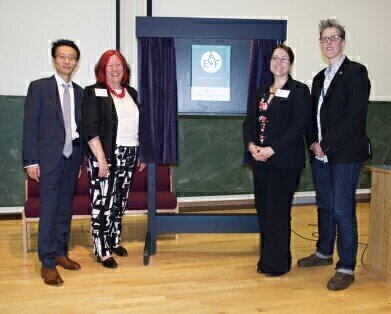-
 Pictured from left: Dr Patrick Cai, Prof Lesley Yellowlees (Head of College of Science and Engineering), Ceri Lyn-Adams (BBSRC) and Pro Susan Rosser, at the formal opening of the Edinburgh Genome Foundry
Pictured from left: Dr Patrick Cai, Prof Lesley Yellowlees (Head of College of Science and Engineering), Ceri Lyn-Adams (BBSRC) and Pro Susan Rosser, at the formal opening of the Edinburgh Genome Foundry
News & Views
DNA Facility to Drive Advances in Cell Functions
Aug 08 2016
Scientists have marked the opening of the UK’s first fully automated DNA production facility that will design, build and test large sections of DNA using large-scale robotic processes.
The Edinburgh Genome Foundry, housed at the University of Edinburgh’s School of Biological Sciences, provides facilities for researchers to create and modify long strands of DNA that can be used to equip cells or organisms with new or improved functions at relatively low cost.
Primarily funded by the Research Councils UK’s Synthetic Biology for Growth Programme, the facility is also supporting an international project to synthesis the entire genome of yeast, a model organism for research into living systems.
Science Minister Jo Johnson said: “The UK is home to the discovery of the DNA double-helix, a ground-breaking moment in modern science. An even greater understanding of DNA, and the ability to construct and modify it will lead to untold scientific discoveries that could save millions of lives around the world.
“Through the investment by the Government, the Edinburgh Genome Foundry will ensure the UK leads the way in pioneering these new medicines.”
Professor Susan Rosser, Co-Director of the Foundry, and Chair in Synthetic Biology at The University of Edinburgh, said: “We are excited to be opening the Edinburgh Genome Foundry, which will allow us to construct DNA on a large scale and will support synthetic biology in the UK. This will help us both interrogate how cells and organisms operate and realise the many economically important applications of synthetic biology.”
Professor Patrick Cai, Co-Director of the Foundry, said: “The Edinburgh Genome Foundry, as the UK’s largest integrated national facility for automated DNA synthesis assembly, will play a key role in ushering in major developments in the field.”
Digital Edition
LMUK 49.7 Nov 2024
November 2024
News - Research & Events News - News & Views Articles - They’re burning the labs... Spotlight Features - Incubators, Freezers & Cooling Equipment - Pumps, Valves & Liquid Hand...
View all digital editions
Events
Nov 18 2024 Shanghai, China
Nov 20 2024 Karachi, Pakistan
Nov 27 2024 Istanbul, Turkey
Jan 22 2025 Tokyo, Japan
Jan 22 2025 Birmingham, UK



.jpg)














